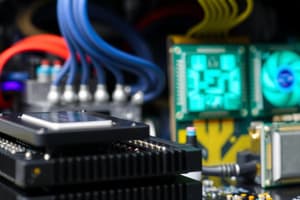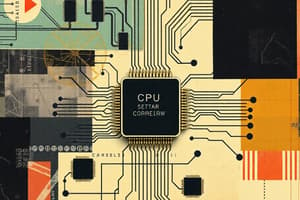Podcast
Questions and Answers
What is the role of the CPU in a computer system?
What is the role of the CPU in a computer system?
- Accepting and executing instructions to perform arithmetic and logical operations (correct)
- Connecting to the motherboard using a special socket
- Storing and manipulating data using logic gates
- Facilitating communication between different components of the computer
How is the CPU connected to the rest of the computer system?
How is the CPU connected to the rest of the computer system?
- By storing and manipulating data
- Through a special socket on the motherboard (correct)
- Via a series of hairline strands of aluminum
- Using millions of microscopic circuits called logic gates
What do logic gates do within the CPU?
What do logic gates do within the CPU?
- Execute arithmetic and logical operations
- Store and manipulate data (correct)
- Connect the CPU to the motherboard
- Facilitate communication between different components
What component is critical for facilitating heat transfer from the CPU to the CPU cooler?
What component is critical for facilitating heat transfer from the CPU to the CPU cooler?
What is the main reason for using a fan in conjunction with a heatsink for CPU cooling?
What is the main reason for using a fan in conjunction with a heatsink for CPU cooling?
What is the purpose of the radiator in CPU cooling?
What is the purpose of the radiator in CPU cooling?
What is the role of thermal paste in CPU cooling?
What is the role of thermal paste in CPU cooling?
What is the role of websites like cpubenchmark.net when selecting a CPU?
What is the role of websites like cpubenchmark.net when selecting a CPU?
What should be ensured regarding the motherboard when selecting a CPU?
What should be ensured regarding the motherboard when selecting a CPU?
Why is it a bad idea to turn on the system for testing purposes without the CPU cooler installed?
Why is it a bad idea to turn on the system for testing purposes without the CPU cooler installed?
What is the purpose of a heatsink in CPU cooling?
What is the purpose of a heatsink in CPU cooling?
What is the function of CPU cache?
What is the function of CPU cache?
What is the primary function of multi-core processors?
What is the primary function of multi-core processors?
What technology allows one physical core to appear as two processors to the operating system?
What technology allows one physical core to appear as two processors to the operating system?
What is the function of GPUs in the context of CPU technologies?
What is the function of GPUs in the context of CPU technologies?
What is the potential downside of overclocking a CPU?
What is the potential downside of overclocking a CPU?
What is the role of virtualization in CPU technologies?
What is the role of virtualization in CPU technologies?
What does the clock speed of a CPU determine?
What does the clock speed of a CPU determine?
What is the function of multithreading in CPU technologies?
What is the function of multithreading in CPU technologies?
What is the potential impact of overclocking on CPU components?
What is the potential impact of overclocking on CPU components?
What is the function of CPU cache in relation to system RAM?
What is the function of CPU cache in relation to system RAM?
What is the primary purpose of Intel's hyper-threading technology?
What is the primary purpose of Intel's hyper-threading technology?
What does virtualization enable in terms of operating systems on a single physical machine?
What does virtualization enable in terms of operating systems on a single physical machine?
What is the function of CPU cache?
What is the function of CPU cache?
What does overclocking involve?
What does overclocking involve?
What is the purpose of Intel's hyper-threading technology?
What is the purpose of Intel's hyper-threading technology?
What is the primary function of GPUs?
What is the primary function of GPUs?
What does virtualization enable?
What does virtualization enable?
What is the role of multi-core processors?
What is the role of multi-core processors?
What is the function of multithreading in a CPU?
What is the function of multithreading in a CPU?
What is the impact of overclocking on a system?
What is the impact of overclocking on a system?
What determines the rate at which the CPU can execute instructions?
What determines the rate at which the CPU can execute instructions?
What are the potential drawbacks of overclocking?
What are the potential drawbacks of overclocking?
What is the purpose of CPU cache?
What is the purpose of CPU cache?
Flashcards are hidden until you start studying
Study Notes
Understanding CPU Components and Technologies
- Electric connections established with the motherboard bus connect the CPU to system RAM, storage devices, video interface, and expansion cards in expansion slots.
- Clock speed, measured in gigahertz, determines the rate at which the CPU can execute instructions, with faster clock speeds enabling more instructions per second.
- Synchronization of all motherboard-connected components, such as RAM, CPU, and expansion cards, requires support for the CPU’s clock speed by the motherboard.
- Overclocking involves pushing the CPU beyond its designed specifications to gain a marginal performance increase, but it can lead to increased heat, electricity consumption, reduced lifespan of components, and potential system instability.
- CPU cache, made of static random access memory (SRAM), stores frequently accessed information from system RAM, significantly boosting performance.
- Multi-core processors with multiple processors within the same CPU package dramatically improve system performance by executing more than one instruction at a time.
- Multithreading allows a single core within a CPU to execute two instructions simultaneously, further increasing system performance, especially when implemented within a multi-core CPU.
- Intel's hyper-threading technology, introduced in 2002, allows one physical core to appear to the operating system as two processors, processing two instructions simultaneously and providing about a 20 percent increase in performance.
- GPUs, specialized for display functions, are located on plug-in cards, in a chipset on the motherboard, or integrated with the CPU on the same chip.
- Virtualization enables the installation and simultaneous running of multiple operating systems on a single physical machine, allowing the consolidation of multiple servers onto a single hardware platform.
- Virtual machines in virtualization appear as self-contained and separate physical systems, allowing for the efficient use of resources and management of multiple server platforms.
- The text provides detailed explanations of CPU components, technologies, and their impact on system performance, including clock speed, overclocking, CPU cache, multi-core processors, multithreading, hyper-threading, GPUs, and virtualization.
Studying That Suits You
Use AI to generate personalized quizzes and flashcards to suit your learning preferences.




